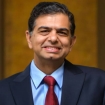Click here - 26th Annual Global CEO Survey: India perspective
Riding the dual imperative to survive and thrive
If 2021 promised hope, resilience defined India in 2022. Despite evidence of a global economic slowdown, continuing high inflation and repercussions across the world of the conflict in Europe, the prognosis for India’s economic growth has largely been positive. According to the World Bank, while India’s economy might show a lower growth in 2022–23 compared to that in 2021–22, it will remain one of the fastest growing major economies in the world because of its robust domestic demand. The World Bank revised its 2022–23 GDP forecast for India upward to 6.9% from 6.5% (in October 2022), while the Reserve Bank of India, in its latest report, lowered its projection marginally to 6.8% for the current fiscal, attributing the same to a global slowdown.2
The global economic climate is undoubtedly uncertain. So, for business leaders in India operating in an interconnected world, the slowing growth in major economies — along with inflation, macroeconomic volatility, climate change and geopolitical risks — is of urgent concern. Their worries are reflected in India CEOs’ responses to a set of nine questions that fall under the following three groups in PwC’s 26th Annual Global CEO Survey:
The findings of our survey, conducted in the last quarter of 2022, while underlining challenges facing business leaders today, underscore a dual imperative that confronts 4,410 CEOs from 105 countries, including 68 from India, who participated in the survey. They indicate that CEOs across geographies do not feel as optimistic about the future as they did in 2021.
About 78% of India CEOs, as against 73% of global CEOs, foresee a decline in global economic growth over the next 12 months.
CEOs in larger Asia Pacific territories, however, show a higher level of optimism (37%) than their global counterparts (29%) in their respective nation’s economic prospects. About 57% of India CEOs, 64% of China CEOs and 50% of Indonesia’s CEOs believe that their respective territory’s economic growth will improve over the next 12 months. At the same time, the global downturn will have a lower impact on countries such as Indonesia and India, where economic prosperity is buffered by significant domestic demand.
Related to the decline in global economic growth are worries on the home front. About four in ten CEOs — global and India —think their organisations will not be economically viable in ten years, if they continue on their current course. Five in ten CEOs in the Asia Pacific region believe that their current business models will not survive in ten years.
Around 40% of CEOs think their businesses will not be viable in 10 years, if they do not transform
But the survey also indicates that given the changing customer demands and supply chain disruptions, CEOs are looking at reinventing their companies over the next five years with the required investments in technology and people — both leaders and workers — without reducing the workforce size, to better meet the challenges of the future.
This dual imperative — of overcoming near-term obstacles while reinventing business for the future — runs through much of this year’s survey. It gives rise to a challenging set of questions on actions that CEOs need to take in the near term and long term to:
- address the potential for widespread business disruption
- develop corporate climate strategies
- assess the time horizons of critical risks
- connect today’s circumstances with tomorrow’s outlook
- balance strategies for business resilience and workforce retention
- plan for contingencies arising out of geopolitical events
- invest time and money in the future
- redefine their role as leaders to empower change
- develop collaborative ecosystems to create new sources of value.
While CEOs are already grappling with most of these issues, we hope to help them zero in on their biggest possibilities and vulnerabilities through this report. We also offer recommendations based on PwC’s research and experience. The report underscores the need to:
- build trust among stakeholders – investors, employees, customers and local communities
- create new sources of value - business and societal
- strengthen collaboration among business and non-business entities
- enhance resilience to macroeconomic volatility, geopolitical turbulence, technology disruptions and climate risks
- address sustainable development and adapt to climate change.
These action steps are an opportunity for CEOs, as a community of solvers, to lead with purpose and play the role society needs them to – catalysing innovation and transformation to remain in business for the long haul. The title of the report – ‘Winning today’s race while running tomorrow’s’ – manifests this challenge.















